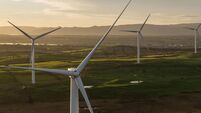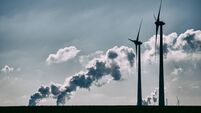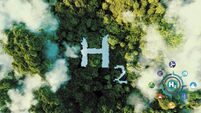Wind energy showing signs of momentum, but problems persist

Irish offshore survey company Green Rebel is continuing to grow its fleet, and has signed a long-term hire agreement with Glomar Offshore for the Glomar Vantage, as part of its continued expansion. Pictured are Green Rebel’s Conor Philpott, Head of IT; Kieran Ivers, CEO; and Alan Cott, Fleet Manager. Picture: Cian Ryan Green Rebel.
Cork company Green Rebel was originally established to deliver its survey and investigative services to the offshore renewable energy sector in Ireland, but policy changes means the majority of its work is done outside of the Irish market.
Kieran Ivers, Chief executive of Green Rebel, explained that a decision made by government last year automatically wiped €6.5m off its pipeline of potential projects and pushed it outside of the market.














